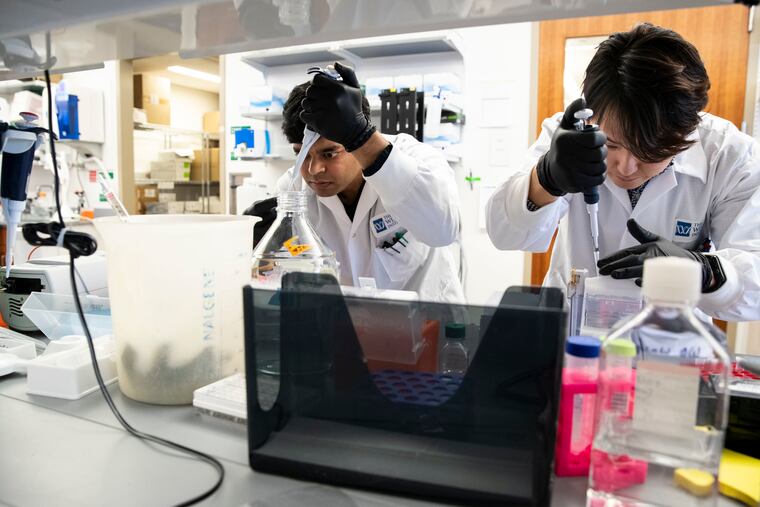Experimental coronavirus vaccine given to Philadelphia volunteers
The first dose of the vaccine, made by Inovio Pharmaceuticals of Plymouth Meeting, was given to volunteers Monday at the University of Pennsylvania.

A few minutes before 4 p.m. Monday, a researcher placed metal probes against the skin of a healthy volunteer at the University of Pennsylvania, delivering a small dose of fluid with a large goal: to protect the world against the coronavirus.
The volunteer was the first of three people this week to receive an experimental vaccine made by Inovio Pharmaceuticals of Plymouth Meeting. The company began work on its vaccine just 10 weeks ago, after Chinese authorities published the microbe’s genetic code, an accelerated schedule that once was unimaginable.
“Here we are the first week of April, and we’re starting to vaccinate people,” said Pablo Tebas, the Penn Medicine physician overseeing the effort. “The whole time frame has been collapsed.”
The study will enroll up to 40 volunteers, split between Penn and the Center for Pharmaceutical Research in Kansas City, Mo., the company said.
Human tests have begun on at least one other vaccine candidate, made by Cambridge, Mass.-based Moderna Inc., but most of the several dozen vaccines in development have not reached that stage.
Each volunteer at Penn will receive two doses of the Inovio vaccine, spaced four weeks apart. Screening of potential participants at the Kansas City site is underway.
A primary goal is to make sure the vaccine, for now called INO-4800, does not cause any adverse effects. Researchers also will analyze blood samples from participants to make sure their immune systems are generating an appropriate response — a key marker of whether their bodies would be able to fight off an infection.
» READ MORE: Why a vaccine will take 18 months
The vaccine volunteers are not being exposed to the virus, at least not on purpose. But separately, scientists are doing that in animal studies. Several dozen labs and companies are at work on vaccines worldwide; none is expected to be ready before next year.
Even so, that timetable would represent the fastest development of a vaccine.
Getting the process done by next year will require a lot of work and careful scrutiny, said Richard Hatchett, chief executive officer of the Coalition for Epidemic Preparedness Innovations, which helped fund development of the Inovio vaccine.
“Producing a COVID-19 vaccine within the next 12 to 18 months is not only a scientific challenge; it will also require new levels of collaboration and investment across industry and government,” he said in a statement issued by Inovio. “There is still a long road ahead before we have a safe, effective, and globally accessible vaccine ready for broader use, but today we have reached an important milestone on that journey.”
Early lab tests of the Inovio vaccine were done at Philadelphia’s Wistar Institute, in the lab of David B. Weiner, a member of Inovio’s board. The technology used to make the vaccine is based on research Weiner did while at Penn.
The approach is dramatically different from that used in most vaccines, in which people are injected with a weakened or killed form of a virus so their immune systems can learn to make antibodies to fight off a real infection.
Instead, the Inovio vaccine is a plasmid: a minuscule package of genetic instructions injected into the person’s skin cells. The cells make a fragment of the virus, enabling the person’s immune system to make antibodies in much the same way it would respond to the weakened or killed viruses in a traditional vaccine.
Called a DNA vaccine, Inovio’s drug can be assembled quickly from chemical components. A traditional whole-virus vaccine, on the other hand, is typically isolated and purified from strains in animals — a process that takes years.
Tebas, an infectious disease specialist at Penn, said there is no shortage of volunteers willing to try the vaccine. The Philadelphia site has enough for the first round of the trial, but if all goes well, more will be needed.
“There has been tremendous interest in this vaccine among people who want to do what they can to help protect the greater public from this pandemic as soon as possible,” he said in the Inovio news release.